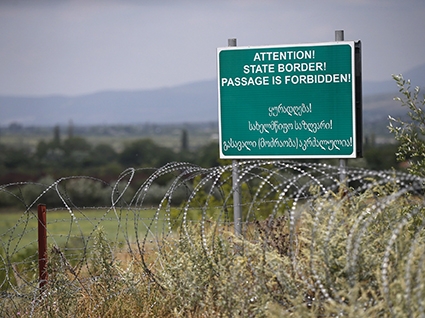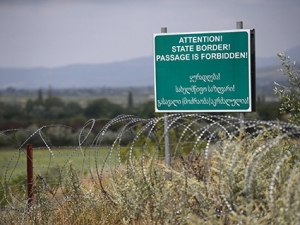Living through the August War
BLOG
The first thing that comes to mind when I think about my childhood is the village I grew up in. Since 2008, this village has been a ‘borderline’ village. In fact, the barbed wire set up by the Russians stands just a few meters from the public school I graduated.
And what comes to my mind when I think about the August War? Fragments of memory.
On August 7, 2008, my brother and father were sitting and watching a Georgian movie, Giorgi Saakadze, when suddenly the power went off. When we went up to the second floor to see what was happening, we saw shooting to the north. The war had begun.
Relations between Ossetians and Georgians were good prior to that moment, even at the beginning of the century when some kind of conflict happened. I remember two or three times we visited relatives in the neighboring Ossetian village where my father's cousin was living. But the Ossetian and Russian politicians changed all that.
My family spent the five days of war in the village, although most other villagers fled to other villages or Tbilisi. Just a few grown-ups and five children chose to stay. I was 7, but even at that young age I felt the threat in the air. We were all glued to the TV. Seeing people leaving their burned-out villages was what first made it hit home for me; the first time I felt afraid. I was afraid of losing everything and everyone. I remember taking out my school-bag and packing it with my school textbooks. I guess I thought they were important. My mom and a relative from the neighboring house barely slept during those five days, ready to wake us up at a moment’s notice if we needed to get out, if the Russians decided to invade our village too.
And one afternoon, there was panic- the villagers had been told to leave as soon as possible because Russian soldiers were on their way. Those of us left in the village moved away from the fighting to the next village. I went in my flip-flops and said goodbye to my house, expecting it to be the last time I saw it. But it wasn’t. We went back at midnight. The village hadn’t been attacked; it was a false alarm. But I remember it was deadly silent.
The alarm hadn’t been false everywhere, though: Gori, the city where my grandparents were living, had been bombed, there was blood and ruined buildings throughout; despair and fear. Russian soldiers announced a curfew and the city was reduced to a shell of what it had been.
Then the shooting stopped. The war was over. But it left thousands of people without homes, living in tents until new settlements could be built. One was set up near my village. Dozens of people died. And a new wound appeared in Georgia- the loss of Samachablo.
School didn’t begin in the middle of September as it usually did: I started two weeks later and still soldiers under the Russian flag could be seen moving along the road through my village, even in front of my school. I was told that if “something” happened, I should lie on the floor.
What happened next? Seeing soldiers became the norm, and even after 10 years you still have to check into the Georgian military post before you can enter the village. We have three military posts and a police station. And you can clearly see the “border” sign warning us away: ‘Attention! State Border! Passage is forbidden.’
We’ve adjusted. Some people came back, some stayed away. And we just…adjusted to our new reality. The government offered the village pupils free university scholarships, and we have good roads, street lights, gas and electricity- something not all villages can boast in Georgia.
But 10 years later, the Russians are still moving the ‘borderlines’ throughout the country, including in my village. 10 years later, they continue to steal our land. 10 years later, they are still arresting and abducting innocent people. 10 years later, Georgia is still occupied.
By Giorgi Muzashvili












